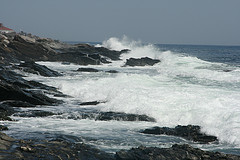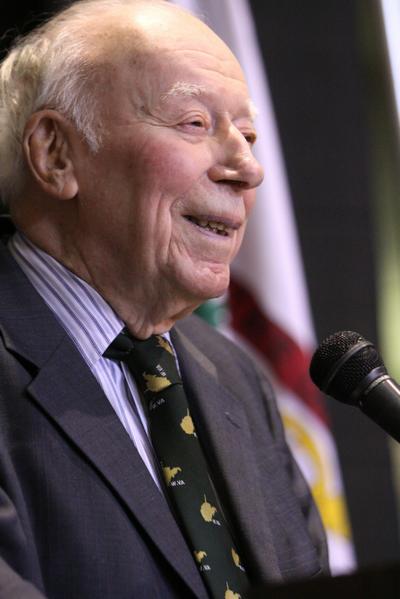“Injustice anywhere is a threat to justice everywhere.” — Martin Luther King, Jr. Letter from Birmingham Jail, 1963
Last month, as protestors from around the country converged in the Coal River Valley in West Virginia to protest Massey Energy’s reckless mountaintop removal blasting operations within a short distance of a 7-billion gallon coal sludge impoundment, their ranks included 94-year-old former US Representative Ken Hechler.
It was not the legendary West Virginia congressman’s first march for justice: In 1965, Hechler was the only member of the US Congress to join Martin Luther King, Jr. on his march for civil rights in Selma, Alabama.
Nearly 45 years after that historic moment, Hechler has a message for President Barack Obama: It’s time for President Obama to have a Harry S. Truman moment, and issue an executive order to abolish the destructive practice of mountaintop removal mining in Appalachia.
Standing in defiance at the Massey property line of a mountaintop removal mining operation that could jeopardize the lives of thousands of valley residents–Massey’s own evacuation plan determined that if the Brushy Fork coal sludge impoundment broke, nearly 1,000 nearby residents would have less than 4 minutes to flee–Hechler called on Washington, DC to recognize the urgent crisis at hand.
On the heels of last December’s TVA coal ash pond disaster, Hechler referred to the Brushy Fork Dam as an example of the “arrogance of power.” Hechler declared: “The freedom of Massey is a clear and present danger to everybody that lives below Brushy Fork. Their freedom ends because they have put thousands of people at risk, who would be surely killed just the way the 125 were killed in 1972 on Buffalo Creek. The first three words of the constitution are ‘We the People,’ not ‘We the Corporations.'”
Hechler said he has great confidence in President Obama’s judgment, though he remains concerned that an obsession with consensus could yield to pressure from the coal lobby. “It’s a pipe dream that you can achieve progress only through consensus,” Hechler told me, “especially when certain coal companies want to drive loopholes through otherwise principled legislation.” “You’ve got to be ready to make enemies in order to accomplish something.”
Hechler is no stranger to courageous American presidents or the investigation of enemies. During World War II, serving as a major, Hechler took part in a five-man team that interrogated Nazi war criminals, including Hermann Goering and Joachim von Ribbentrop. As a history professor and author, he assisted Franklin D. Roosevelt with his 13-volume “Public Papers and Addresses of Franklin D. Roosevelt.” But it was his tenure as a special research assistant for President Harry Truman that taught Hechler a lesson on a president’s imperative to go against the Washington lobbies and conventional wisdom and make a historic stand. In Truman’s case, risking the backlash of his own Democratic Party, and with a recent Gallup Poll that 82 percent of Americans were against his civil rights program, the president issued two “blockbuster executive orders” on July 26, 1948: Truman integrated the US military.
For Hechler, it is time for President Obama, who called for an end to “blowing off the tops of mountains” in his campaign, to make a historic move for justice in the coalfields.
A hero to coal miners in Appalachia and around the nation, Hechler’s understanding of the complexities of the coalfield economy is unmatched in the country. Hechler’s congressional leadership led to the passing of The Federal Coal Mine Health and Safety Act of 1969, which was the first legislation to deal with black lung disease from coal dust. In 1971, Hechler took the lead in dealing with another coal mining issue: strip-mining and mountaintop removal. He held the first hearings on mountaintop removal in 1971.
Hechler introduced the first federal bill to abolish strip-mining in the spring of 1971. As Hechler testified in a House committee in 1971: “Representing the largest coal-producing state in the nation, I can testify that strip-mining has ripped the guts out of our mountains, polluted our streams with acid and silt, uprooted trees and forests, devastated the land, seriously destroyed wildlife habitat, left miles of ugly highwalls, ruined the water supply in many areas, and left a trail of utter despair for many honest and hard-working people.”
In 1977, Hechler’s long-time crusade against strip-mining was ultimately betrayed by various compromising forces in Congress, resulting in the passing of the Surface Mining Control and Reclamation Act, which provided federal sanctioning of mountaintop removal. Since then, over 500 mountains in Appalachia have been blown to bits, over 1.5 million acres of hardwood forests in the most diverse and ancient mountain range on the continent have been wiped out, and 1,200 miles of streams have been jammed and sullied with mining waste. And Appalachia’s coalfields remain a “trail of utter despair” for many communities.
As three million pounds of ammonium nitrate/fuel oil explosives continue to rip daily through the Appalachian mountains, and as the EPA continues to hand out permits for mountaintop removal, whether or not President Obama heeds Rep. Hechler’s call for a courageous Truman moment remains to be seen.
Standing in the sun at the Massey Energy mountaintop removal operation last month, the 94-year-old Hechler showed no sign of retreating on this egregious violation of human rights and the environment. “It’s absolutely necessary that people here today continue to demonstrate against this highly destructive practice,” he called out to the protestors.
Here’s a clip from Russ Barbour and Chip Hitchcock’s film documentary on Hechler, “Pursuit of Justice”:



